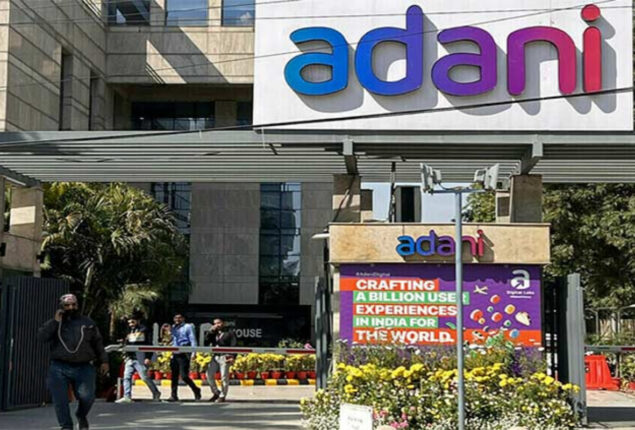BJP slams Soros for saying Adani crisis weaken Modi
George Soros is accused of attempting to undermine India's democracy by speculating....

How India’s scandal-hit Adani Group silences critics
Independent Indian journalist Paranjoy Guha Thakurta is being sued in six different courts by tycoon Gautam Adani’s corporate empire — and he is not permitted to speak about the conglomerate or its owner.
Hindenburg Research, a US research firm whose scathing report on Adani Group last month prompted a stock rout that wiped off $120 billion from the company’s value, said the company had long exploited the threat of a lawsuit to insulate itself from more scrutiny.
Hindenburg is a short-seller who not only monitors corporate misbehavior but also profits by betting on stock prices falling.
It accused the globe-spanning ports-to-power giant of accounting fraud and stock manipulation, saying that “investors, media, people, and even politicians have been hesitant to speak out for fear of punishment”.
Thakurta, 67, was faced with six defamation suits, three of which were criminal in nature, after publishing a series of papers on Adani in which he claimed a top court gave it preferential treatment.
If convicted, he faces jail time, and a court order prohibits him from writing or speaking about the company or its owner.
“A gag order was served on me,” he said. “I was told that I could not comment on the activities of Mr. Gautam Adani and his corporate conglomerate. So I don’t want to commit contempt of court.”
Legal costs and the need to attend hearings in three states “take a toll on us physically and mentally”, said his colleague Abir Dasgupta, himself hit with three defamation suits.
“It takes up our time, it affects our families, it has led to a loss of time and loss of income for all of us.”
After Hindenburg’s charges, Adani Group began into damage management mode last month.
According to short-seller research, the company artificially inflated its market value through related-party transactions done through tax havens.
The stock market reaction sent the firm’s billionaire creator, Asia’s richest man at the time, down the ranks of the world’s richest people, though shares in the group’s listed firms have since stabilized.
The company denies the allegations and has vowed to sue Hindenburg.
It has also taken legal action against other overseas critics, claiming that environmental activist Ben Pennings lost it millions of dollars during his campaign against its coal mining project in Queensland.
An Adani subsidiary has filed criminal defamation lawsuits against two journalists from CNBC TV18, accusing them of a “grossly malicious, defamatory, and misleading” news report.
“Adani Group believes strongly in the freedom of the press and like all companies retains the right to defend itself against defamatory, misleading, or false statements,” a conglomerate spokesperson said.
“In the past, Adani has at times exercised those rights. The group has always acted in accordance with all applicable laws.”
The charges generated headlines around the world, yet many Indian media sources ignored, disregarded, or condemned the authors.
Numerous people agreed with Adani Group that Hindenburg’s research was a planned “attack on India,” with one television panelist labeling it “financial terrorism” against the country.
The creator of the corporation is close to Prime Minister Narendra Modi, and opposition MPs allege both have benefited from their mutual friendship.
Opponents argue that the Indian media’s unwillingness to investigate the Adani charges reflects the two men’s tight ties.
“That’s got a lot to do with Adani’s story being linked to the Modi story,” said journalist Manisha Pande of Newslaundry, a website known for critical coverage of India’s media landscape.
India has nearly 400 television news channels but Modi’s government generally benefits from enthusiastically positive coverage.
Hindenburg’s report, according to Pande, was “seen as an attack on not just a corporate house, but an attack on Modi, his decision, his tenure”.
Adani himself became a media owner in December when he purchased the broadcaster NDTV, which was previously renowned as one of the few media outlets ready to openly criticize India’s leader.
The tycoon brushed away press freedom anxieties and told the Financial Times that journalists should have the “confidence” to state “when the government is doing the right thing every day”.
One of NDTV’s most popular anchors resigned within hours of Adani’s purchase.
Ravish Kumar, a vociferous critic of Modi, later stated that he was “convinced” the acquisition was made with the intention of silencing criticism.
“Adani does not promote questioning or criticism in any manner,” he told the online news portal The Wire.
Thakurta told to the sources that numerous Indian business leaders had taken stakes in media houses to “shut out opinions and information that does not favor them”.
He said Indian media acted as a “nexus” between corporate and state power.
“It should not be surprising that such a large section of media in India should be so subservient to big business interests.”
Catch all the India News, World News, Breaking News Event and Latest News Updates on The BOL News
Download The BOL News App to get the Daily News Update & Follow us on Google News.